|
|
|
Sort Order |
|
|
|
Items / Page
|
|
|
|
|
|
|
| Srl | Item |
| 1 |
ID:
051727
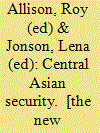

|
|
|
|
|
| Publication |
London, Royal Institute of international Affairs, 2001.
|
| Description |
xv, 279p.
|
| Standard Number |
0815701055
|
|
|
|
|
|
|
|
|
|
|
|
Copies: C:1/I:0,R:0,Q:0
Circulation
| Accession# | Call# | Current Location | Status | Policy | Location |
| 045997 | 327.0958/ALL 045997 | Main | On Shelf | General | |
|
|
|
|
| 2 |
ID:
074370
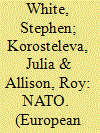

|
|
|
|
|
| Publication |
2006.
|
| Summary/Abstract |
Relations between Russia, Ukraine and Belarus and NATO have placed more emphasis on cooperation than confrontation since the Cold War, and Ukraine has begun to move towards membership. At the popular level, on the evidence of national surveys in 2004 and 2005, NATO continues to be perceived as a significant threat, but in Russia and Ukraine it comes behind the United States (in Belarus the numbers are similar). There are few socioeconomic predictors of support for NATO membership that are significant across all three countries, but there are wide differences by region, and by attitudinal variables such as support for a market economy and for EU membership. The relationship between popular attitudes and foreign policy is normally a distant one; but in Ukraine NATO membership will require public support in a referendum, and in all three cases public attitudes on foreign policy issues can influence foreign policy in other ways, including the composition of parliamentary committees. In newly independent states whose international allegiances are still evolving, the associations between public opinion and foreign and security policy may often be closer than in the established democracies.
|
|
|
|
|
|
|
|
|
|
|
|
|
|
|
|
| 3 |
ID:
160730
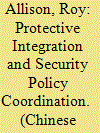

|
|
|
|
|
| Summary/Abstract |
This article contributes to research on non-Western regionalism by examining the function of security policy coordination in two macro-regional organisations in Eurasia, which include the primary non-Western powers: the Shanghai Cooperation Organisation (SCO)—with China and Russia—and the Collective Security Treaty Organisation (CSTO)—with Russia. The SCO has wider formal functions, and the CSTO is more hierarchical in practice, but both claim to be regional security providers with a focus on Central Asia. It is puzzling that Member States stress the importance of these organisations, that there have been regular meetings for over 15 years, yet their functionality is low judging by their ability to implement various ambitious projects. This article offers the explanation for this in the focus of SCO and CSTO Member State leaders on the interaction between domestic political, and regional security priorities. As a result, these bodies express the phenomenon of ‘protective integration’.
|
|
|
|
|
|
|
|
|
|
|
|
|
|
|
|
| 4 |
ID:
160728
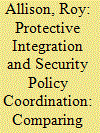

|
|
|
|
|
| Summary/Abstract |
This article contributes to research on non-Western regionalism by examining the function of security policy coordination in two macro-regional organisations in Eurasia, which include the primary non-Western powers: the Shanghai Cooperation Organisation (SCO)—with China and Russia—and the Collective Security Treaty Organisation (CSTO)—with Russia. The SCO has wider formal functions, and the CSTO is more hierarchical in practice, but both claim to be regional security providers with a focus on Central Asia. It is puzzling that Member States stress the importance of these organisations, that there have been regular meetings for over 15 years, yet their functionality is low judging by their ability to implement various ambitious projects. This article offers the explanation for this in the focus of SCO and CSTO Member State leaders on the interaction between domestic political, and regional security priorities. As a result, these bodies express the phenomenon of ‘protective integration’. It is a phenomenon that does not offer substantive regional integration or emphasise collective-action problem solving. It is intended to be sovereignty enhancing and to bolster regime security, stability, and legitimacy. It fosters a culture of interaction, normative bonding, and collective political solidarity. This is confirmed in empirical analysis of SCO and CSTO discourse and agreements over counter-terrorism, information security, and foreign policy coordination. However, the bonds of protective integration have weakened as separatism has become a divisive issue since 2014 over Russian action in Ukraine. Moreover, organisational enlargement of the SCO further threatens its cohesion, while it is being displaced by the belt and road initiative in the wider context of Chinese foreign and economic policy priorities. Neither the SCO nor the CSTO are likely to be dissolved, but their purposes are likely to become more diffuse.
|
|
|
|
|
|
|
|
|
|
|
|
|
|
|
|
| 5 |
ID:
160729
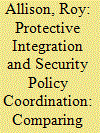

|
|
|
|
|
| Summary/Abstract |
This article contributes to research on non-Western regionalism by examining the function of security policy coordination in two macro-regional organisations in Eurasia, which include the primary non-Western powers: the Shanghai Cooperation Organisation (SCO)—with China and Russia—and the Collective Security Treaty Organisation (CSTO)—with Russia. The SCO has wider formal functions, and the CSTO is more hierarchical in practice, but both claim to be regional security providers with a focus on Central Asia. It is puzzling that Member States stress the importance of these organisations, that there have been regular meetings for over 15 years, yet their functionality is low judging by their ability to implement various ambitious projects. This article offers the explanation for this in the focus of SCO and CSTO Member State leaders on the interaction between domestic political, and regional security priorities. As a result, these bodies express the phenomenon of ‘protective integration’. It is a phenomenon that does not offer substantive regional integration or emphasise collective-action problem solving. It is intended to be sovereignty enhancing and to bolster regime security, stability, and legitimacy. It fosters a culture of interaction, normative bonding, and collective political solidarity. This is confirmed in empirical analysis of SCO and CSTO discourse and agreements over counter-terrorism, information security, and foreign policy coordination. However, the bonds of protective integration have weakened as separatism has become a divisive issue since 2014 over Russian action in Ukraine.
|
|
|
|
|
|
|
|
|
|
|
|
|
|
|
|
| 6 |
ID:
075518
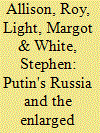

|
|
|
|
|
| Publication |
Malden, Blackwell Publishing, 2006.
|
| Description |
vi, 229p.
|
| Standard Number |
1405126477
|
|
|
|
|
|
|
|
|
|
|
|
Copies: C:1/I:0,R:0,Q:0
Circulation
| Accession# | Call# | Current Location | Status | Policy | Location |
| 052021 | 327.470490511/ALL 052021 | Main | On Shelf | General | |
|
|
|
|
| 7 |
ID:
005234
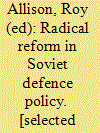

|
|
|
|
|
| Publication |
Houndmills, Macmillan, 1994.
|
| Description |
xviii, 238p.
|
| Standard Number |
033355325X
|
|
|
|
|
|
|
|
|
|
|
|
Copies: C:1/I:0,R:0,Q:0
Circulation
| Accession# | Call# | Current Location | Status | Policy | Location |
| 036414 | 355.00947/ALL 036414 | Main | On Shelf | General | |
|
|
|
|
| 8 |
ID:
052212
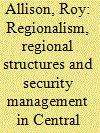

|
|
|
| 9 |
ID:
123980
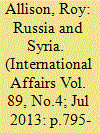

|
|
|
|
|
| Publication |
2013.
|
| Summary/Abstract |
This article explores explanations of Russia's unyielding alignment with the Syrian regime of Bashar al-Assad since the Syrian crisis erupted in the spring of 2011.
Russia has provided a diplomatic shield for Damascus in the UN Security Council and has continued to supply it with modern arms. Putin's resistance to any scenario of western-led intervention in Syria, on the model of the Libya campaign, in itself does not explain Russian policy. For this we need to analyse underlying Russian motives. The article argues that identity or solidarity between the Soviet Union/Russia and Syria has exerted little real influence, besides leaving some strategic nostalgia among Russian security policy-makers. Russian material interests in Syria are also overstated, although Russia still hopes to entrench itself in the regional politics of the Middle East.
Of more significance is the potential impact of the Syria crisis on the domestic political order of the Russian state. First, the nexus between regional spillover from Syria, Islamist networks and insurgency in the North Caucasus is a cause of concern-although the risk of 'blowback' to Russia is exaggerated. Second, Moscow rejects calls for the departure of Assad as another case of the western community imposing standards of political legitimacy on a 'sovereign state' to enforce regime change, with future implications for Russia or other authoritarian members of the Commonwealth of Independent States.
Russia may try to enshrine its influence in the Middle East through a peace process for Syria, but if Syria descends further into chaos western states may be able to achieve no more in practice than emergency coordination with Russia.
|
|
|
|
|
|
|
|
|
|
|
|
|
|
|
|
| 10 |
ID:
153853
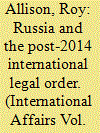

|
|
|
|
|
| Summary/Abstract |
Russia's annexation of Crimea and military intervention in eastern Ukraine, as well as Moscow's claims around these acts, challenge the post-Cold War territorial settlement and its underlying international legal principles. Unlike previous controversies over western-led interventions, a major power has used force to expand its territorial sphere. Russia's actions contradict its traditional focus on UN Charter principles and sovereignty in the wider international system. This article questions whether Russia has a serious agenda to gain support for revised understandings of international law, at least as applied to what it views as a Commonwealth of Independent States (CIS) region of entitlements. Or is Russia driven more by realpolitik, whereby legal discourse contributes to a strategic effort to force changes in the European territorial order, in the first instance in its direct neighbourhood? These uncertainties are contrasted to Russia's single-minded narrative on the threat of regime change. Moscow uses the spectre of ‘colour revolutions’ to influence a variety of states in the wider international system. Overall, so far Russia has failed to shift legal understandings in its favour over Crimea/Ukraine. Yet it continues to view the CIS states as only partly sovereign, as located in a zone of exception. Moscow seems intent on changing the European security and territorial order in its favour, regardless of the language of legal principles it deploys in its wider international diplomacy.
|
|
|
|
|
|
|
|
|
|
|
|
|
|
|
|
| 11 |
ID:
083993
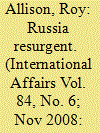

|
|
|
|
|
| Publication |
2008.
|
| Summary/Abstract |
Russia's military incursion into Georgia in August 2008 and formal recognition of South Ossetia and Abkhazia raise fundamental questions about Russian regional policy, strategic objectives and attitudes to the use of armed force. The spectacle of maneouvre warfare on the periphery of Europe could form a watershed in post-Cold War Russian relations with its neighbourhood and the wider international community. The speed and scale with which Russia's initial 'defensive' intervention to 'coerce Georgia to peace' led to a broad occupation of many Georgian regions focuses attention on the motivations behind Russian military preparations for war and the political gains Moscow expected from such a broad offensive. Russia has failed to advance a convincing legal case for its operations and its 'peace operations' discourse has been essentially rhetorical. Some Russian goals may be inferred: the creation of military protectorates in South Ossetia and Abkhazia; inducing Georgian compliance, especially to block its path towards NATO; and creating a climate of uncertainty over energy routes in the South Caucasus. Moscow's warning that it will defend its 'citizens' (nationals) at all costs broadens the scope of concerns to Russia's other neighbour states, especially Ukraine. Yet an overreaction to alarmist scenarios of a new era of coercive diplomacy may only encourage Russian insistence that its status, that of an aspirant global power, be respected. This will continue to be fuelled by internal political and psychological considerations in Russia. Careful attention will need to be given to the role Russia attributes to military power in pursuing its revisionist stance in the international system.
|
|
|
|
|
|
|
|
|
|
|
|
|
|
|
|
| 12 |
ID:
189230
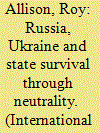

|
|
|
|
|
| Summary/Abstract |
During the Cold War neutrality and a ‘non-bloc’ status were used by certain European states to escape great power rivalries. But these foreign and security policy strategies declined in significance and have received little scholarly attention since the early 1990s. This article argues that in a period of renewed confrontation between Russia and western powers, significant insights may be derived from a critical review of the past experiences of neutral and non-bloc states. These help scholars and practitioners assess the contemporary options of states in vulnerable locations which choose or are compelled to survive outside alliances. This article probes the critical case of Ukraine as a sovereign but potentially neutral state. Relevant criteria for neutrality are drawn from short interpretive case-studies of Austria and Finland during the Cold War, as well as Moldova and Finland in post-Cold War years. Soviet and Russian policy prioritized the strategic denial of these states to NATO, while forms of armed neutrality helped sustain conventional deterrence against Russian coercion. If Moscow reigns in its ambitions for the political subjugation of Ukraine and accepts its statehood, such thinking may form part of an eventual security policy settlement beyond the current war.
|
|
|
|
|
|
|
|
|
|
|
|
|
|
|
|
| 13 |
ID:
135866
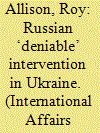

|
|
|
|
|
| Summary/Abstract |
The Russian military interventions in Ukraine, which have led to the annexation of the Crimean peninsula and to the entrenchment of separatist enclaves in Donetsk and Luhansk provinces, directly challenge the post-Cold War European state system. Russia has consistently denied any wrongdoing or illegal military involvement and has presented its policies as a reaction to the repression of ethnic Russians and Russian speakers. This article argues that it is important to examine and contest unfounded Russian legal and political claims used by Moscow to justify its interventions. The article proceeds to assess in detail three different explanations of the Russian operations in Ukraine: geopolitical competition and structural power (including the strategic benefits of seizing Crimea); identity and ideational factors; and the search for domestic political consolidation in Russia. These have all played a role, although the role of identity appears the least convincing in explaining the timing and scope of Russian encroachments on Ukrainian territorial integrity and the disruption of Ukrainian statehood.
|
|
|
|
|
|
|
|
|
|
|
|
|
|
|
|
| 14 |
ID:
092906
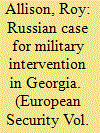

|
|
|
|
|
| Publication |
2009.
|
| Summary/Abstract |
The Russian military intervention in Georgia in August 2008 has raised significant questions about Russian thinking and practice on the legitimate use of military force abroad, especially in relation to neighbour states. The arguments advanced by Russia to justify this campaign show how Russian interpretations of customary international law as well as norms related to the use of force have served as an instrument of state policy, rather than being rooted in any broader international consensus. The Russian discourse in this context about sovereignty, self-determination and the legitimacy of recognising South Ossetia and Abkhazia as states appears similarly to be strongly influenced by political self-interest and Russian views about its entitlement within the Commonwealth of Independent States (CIS) region. Among Russian claims, Moscow's commitment to support its 'citizens' abroad has been particularly controversial. This article examines these issues and also the possibility that, through its justifications for waging war against Georgia, Russia is more broadly contesting the interpretation of certain international norms, that it regards as essentially constructed by Western states. Some potential implications of these legal and normative arguments for future Russian policy in the CIS region, including Ukraine, are also examined.
|
|
|
|
|
|
|
|
|
|
|
|
|
|
|
|
| 15 |
ID:
173232
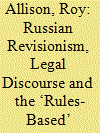

|
|
|
|
|
| Summary/Abstract |
Russia has been accused of revisionism in its foreign policy, understood as an effort to undermine a ‘rules-based’ international order. This essay analyses the normative dimension of such revisionism. It examines Russian legal discourse in the period 2014–2019, based on case studies of Russian interventions in Ukraine and Syria. It finds little evidence of sustained Russian legal revisionism—an effort to modify international law—despite Russian assertion of legal exceptionalism in the CIS region. It confirms previous research that Russia has deployed legal rhetoric strategically and instrumentally. Moscow understands it cannot easily gain international support for new rules, yet still seems to aspire to revise the structure of regional power relations.
|
|
|
|
|
|
|
|
|
|
|
|
|
|
|
|
| 16 |
ID:
001143
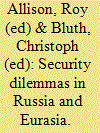

|
|
|
|
|
| Publication |
London, Royal Institute of international Affairs, 1998.
|
| Description |
xx, 358p.
|
| Standard Number |
186203026X
|
|
|
|
|
|
|
|
|
|
|
|
Copies: C:1/I:0,R:0,Q:0
Circulation
| Accession# | Call# | Current Location | Status | Policy | Location |
| 040646 | 355.033047/ALL 040646 | Main | On Shelf | General | |
|
|
|
|
| 17 |
ID:
026351
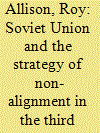

|
|
|
|
|
| Publication |
Cambridge, Cambridge University Press, 1988.
|
| Description |
vi, 298p.
|
| Standard Number |
0521355117
|
|
|
|
|
|
|
|
|
|
|
|
Copies: C:1/I:0,R:0,Q:0
Circulation
| Accession# | Call# | Current Location | Status | Policy | Location |
| 030097 | 327.4701724/ALL 030097 | Main | On Shelf | General | |
|
|
|
|
| 18 |
ID:
051486
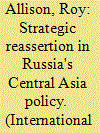

|
|
|
| 19 |
ID:
030160
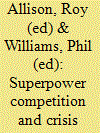

|
|
|
|
|
| Publication |
Cambridge, Cambridge University Press, 1990.
|
| Description |
xii, 281p.
|
| Series |
Ford/Southampton research projects`North/South security relations'
|
| Standard Number |
0521362806
|
|
|
|
|
|
|
|
|
|
|
|
Copies: C:1/I:0,R:0,Q:0
Circulation
| Accession# | Call# | Current Location | Status | Policy | Location |
| 031825 | 327.091724/SUP 031825 | Main | On Shelf | General | |
|
|
|
|
| 20 |
ID:
083730
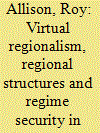

|
|
|
|
|
| Publication |
2008.
|
| Summary/Abstract |
The failures of regionalism and regional structures for cooperation between the five CIS Central Asian states are well studied. However, explanations so far do not convincingly account for the apparent enthusiasm of these states for the macro-regional frameworks of the Eurasian Economic Community, the Collective Security Treaty Organization and the Shanghai Cooperation Organization. This article argues that, as with previous efforts at Central Asian regional self-organization, these broader organizations still largely represent a form of 'virtual regionalism'. But for the Central Asian states they offer a new and increasingly important function, that of 'protective integration'. This takes the form of collective political solidarity or 'bandwagoning' with Russia (and China in the SCO) against processes and pressures that are perceived as challenging incumbent leaders and their political entourage. A primary motivation for Central Asian leaders' engagement in the EAEC, CSTO and SCO, therefore, is the reinforcement of domestic regime security and the resistance of 'external' agendas of good governance or democracy promotion. These goals are concealed behind a discourse that denigrates the imposition of external 'values' and continues to give pride of place to national sovereignty. This offers little to overcome the underlying fractures between states in Central Asia.
|
|
|
|
|
|
|
|
|
|
|
|
|
|
|
|
|
|
|
|
|